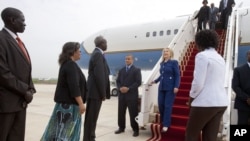NAIROBI — U.S. Secretary of State Hillary Clinton visits Kenya's capital, Nairobi, Saturday to urge Somali leaders to complete a political transition to a new government on schedule. Clinton has previously threatened that the U.S. will impose sanctions on anyone seeking to sabotage the process.
Secretary Clinton's visit comes as Somalia enters the final stages of a political transition due to end August 20 when the United Nations mandate for the existing transitional government expires.
Somali leaders have a lot of work to do until then, including selecting members of the next parliament and electing a new president.
In a statement Thursday, following Somalia's adoption of a new provisional constitution, Clinton urged Somali leaders to complete the remaining tasks “quickly and transparently” so the country is “able to usher in a new era of governance that is more responsive, representative, and accountable.”
Somalia has been without a stable central government since 1991.
Clinton is to meet with the president of Somalia's Transitional Federal Government (TFG), Sheikh Sharif Sheikh Ahmed, and other signatories of the so-called Roadmap Process for ending the transition.
Rashid Abdi, Somali analyst and editor at the Daily Nation newspaper in Nairobi, says Clinton's visit is a chance to send a strong message from the international community.
“The international community desperately wants to see this transition lead to a new government," said Abdi. "And the timetable, they have to stick to the timetable. And I think that message must be reiterated more forcefully by Clinton when she comes to Nairobi.”
In February, Clinton threatened sanctions against anyone inside or outside Somalia's transitional government who undermines the peace process.
Abdi says the U.S. threats will be taken seriously, as Washington has historically had a strong influence on the country.
“No, there's no doubt the United States is the pre-eminent international power which has influence on Somali politics and Somali affairs," he said. "It has been engaged in that country for a long, long time. The focus in the past has always been on counterterrorism efforts, but now I think increasingly we're seeing some help for the broader stabilization problem in Somalia.”
Clinton will also meet with Kenyan President Mwai Kibaki and Prime Minister Raila Odinga Saturday.
The State Department says she will emphasize U.S. support for transparent and non-violent presidential elections next year.
This will be Clinton's second trip to Kenya as Secretary of State, following a previous visit in 2009.
Secretary Clinton's visit comes as Somalia enters the final stages of a political transition due to end August 20 when the United Nations mandate for the existing transitional government expires.
Somali leaders have a lot of work to do until then, including selecting members of the next parliament and electing a new president.
In a statement Thursday, following Somalia's adoption of a new provisional constitution, Clinton urged Somali leaders to complete the remaining tasks “quickly and transparently” so the country is “able to usher in a new era of governance that is more responsive, representative, and accountable.”
Somalia has been without a stable central government since 1991.
Clinton is to meet with the president of Somalia's Transitional Federal Government (TFG), Sheikh Sharif Sheikh Ahmed, and other signatories of the so-called Roadmap Process for ending the transition.
Rashid Abdi, Somali analyst and editor at the Daily Nation newspaper in Nairobi, says Clinton's visit is a chance to send a strong message from the international community.
“The international community desperately wants to see this transition lead to a new government," said Abdi. "And the timetable, they have to stick to the timetable. And I think that message must be reiterated more forcefully by Clinton when she comes to Nairobi.”
In February, Clinton threatened sanctions against anyone inside or outside Somalia's transitional government who undermines the peace process.
Abdi says the U.S. threats will be taken seriously, as Washington has historically had a strong influence on the country.
“No, there's no doubt the United States is the pre-eminent international power which has influence on Somali politics and Somali affairs," he said. "It has been engaged in that country for a long, long time. The focus in the past has always been on counterterrorism efforts, but now I think increasingly we're seeing some help for the broader stabilization problem in Somalia.”
Clinton will also meet with Kenyan President Mwai Kibaki and Prime Minister Raila Odinga Saturday.
The State Department says she will emphasize U.S. support for transparent and non-violent presidential elections next year.
This will be Clinton's second trip to Kenya as Secretary of State, following a previous visit in 2009.




